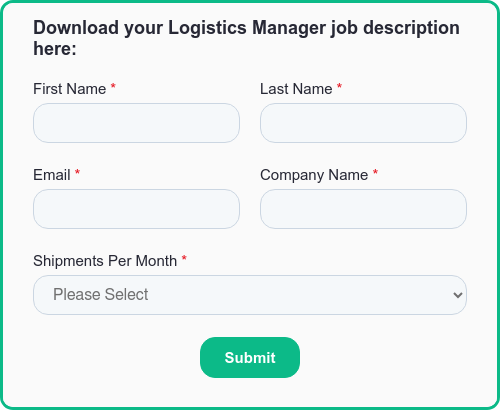Share this
How to Hire a Logistics Manager for Ecommerce
by Kyla Friel on Oct. 25, 2023

The ability to manage the logistics of inbound and outbound goods is vital to the success of an ecommerce business. How can you ensure your goods are moved efficiently? Adding a logistics manager for ecommerce to your team can help you manage this vital phase of the supply chain. They can also support your bottom line by negotiating deals with transport and shipping firms or hiring and onboarding warehouse staff to keep your operations running smoothly.
A logistics manager will be the link between your supplier relationships and the inner workings of your warehouse and logistics team. With the support of a logistics manager for ecommerce, you can optimize your operation and supplier costs, the timeliness of your inbound and outbound goods, and your inventory management. In this article, we explore what a logistics manager actually does, and how hiring one can help optimize your growing ecommerce business. We’ve also created a free logistics manager job description template you can use to jumpstart your search for the right candidate.
What Does a Logistics Manager Do?
Logistics managers are pivotal in ensuring the efficient movement, storage, and delivery of goods for ecommerce businesses. With the world moving towards faster delivery times and more efficient warehousing, their role is becoming increasingly critical. Their responsibilities typically include:
Key Responsibilities of a Logistics Manager in Ecommerce
- Transportation Management: They handle the movement of products to ensure goods are delivered efficiently and on time. This involves selecting carriers, coordinating shipments, and negotiating transport rates.
- Warehouse Management: They oversee the storage, distribution, and dispatch of goods. This involves ensuring efficient space usage and optimizing the flow of products in and out of the warehouse.
- Inventory Control: Logistics managers often work closely with inventory teams to ensure products are available for shipment and that storage levels are optimal.
- Team Management: They manage teams involved in transportation and warehousing activities, ensuring they’re well-coordinated and operate smoothly.
- Budget Management: They set and adhere to budgets related to transportation and warehousing operations.
- Vendor Relations: They maintain relationships with transport providers, warehouse facility providers, and other vendors related to logistics.
- Compliance: Ensure transportation and warehousing operations comply with local, state, or international regulations.
- Risk Management: They plan for and manage risks related to transportation and storage, like potential disruptions or damages.
- Reporting: Analyze and report on logistics performance metrics to higher management and suggest improvements.
- Warehouse Operations: A logistics manager oversees the day-to-day operations within a warehouse. This includes ensuring that machinery is well-maintained and that warehouse staff are well-trained and effective in their roles.
- Quality Monitoring: They are responsible for implementing and overseeing quality checks on all products within the logistics chain. This ensures goods are stored and transported without damage.
- Shipping and Customs: Logistics managers must be familiar with international shipping and customs processes. They ensure all inbound and outbound shipments adhere to the relevant standards and regulations, reducing the risk of delays or penalties.
Is a Logistics Manager the Right Role?
You might be wondering if a Logistics Manager is the right fit for your business. You may have also come across roles like Supply Chain Manager or VP of Operations and are unsure which is the better match for your company’s needs. What’s the difference between these roles? This section will clarify which role might be best suited for different business scenarios
Logistics Manager
A logistics manager is responsible for the planning, coordination, and monitoring of the movement of goods, services, and information. They ensure that products and services are delivered to the right location, in the correct quantity, and at the desired time. They do all this while optimizing costs and maintaining quality standards. This encompasses a range of activities, including inventory control, warehousing, transportation management, and customer service.
They also handle intricate details like managing relationships with suppliers and transportation providers. They ensure compliance with regulations and use information technology systems to track shipments and predict possible disruptions. Efficient logistics processes can lead to cost savings, timely deliveries, and increased customer satisfaction.
Supply Chain Manager
A supply chain manager oversees supply chain processes to ensure the efficient movement of goods from suppliers to end customers. This role encompasses a variety of tasks, from procurement of raw materials to distribution and logistics.
A primary responsibility is to streamline operations in a way that reduces costs while improving quality and delivery times. This involves coordinating with suppliers, manufacturers, and distribution centers to monitor inventory levels, predict product demands, and ensure timely and cost-effective delivery of products.
A supply chain manager is also responsible for risk management. They must anticipate disruptions in the supply chain and develop strategies to mitigate potential impacts. Their role is crucial in ensuring that businesses remain competitive by delivering products efficiently and managing resources effectively.
VP of Operations
A VP of Operations, or Vice President of Operations, plays a pivotal role in a company’s strategic planning and execution. They are responsible for overseeing the day-to-day operations of a company, ensuring that the organization runs efficiently and effectively. Their responsibilities typically span a wide range of functions, from production and quality control to human resources and procurement. The aim is to optimize workflows, enhance productivity, and guarantee consistent delivery of products or services to meet customer demands.
Beyond the immediate operations tasks, a VP of Operations also provides leadership and vision to the organization. They collaborate closely with other executive members, including the CEO and CFO, to align operations goals with the company’s broader strategy. By assessing operations challenges and identifying opportunities for growth, they drive improvements and foster innovation within the company. Their decision-making and guidance are essential for a company’s sustained growth and success.
Which One Should You Hire?
Choosing between these roles depends largely on your business needs:
If your primary concern is efficient warehouse operations and managing relationships with transportation providers, a Logistics Manager is your best bet. They are responsible for the end phase of logistics and supply chain management, ensuring products reach their destinations seamlessly.
Businesses dealing with intricate supply chains involving multiple stages and providers might need a Supply Chain Manager. They can provide a holistic approach, ensuring every link in the chain operates optimally.
If you need someone to lead different departments and steer the company’s strategy, you need a VP of Operations. They’ll help align the broader company strategy with on-the-ground realities.
Logistics Manager Job Description
Download our free, customizable Logistics Manager job description template to find the perfect candidate for your company right away.

How a Growing Ecommerce Company Can Benefit From Hiring a Logistics Manager
Here are some reasons why a growing ecommerce business can benefit from having a logistics manager on board:
Streamlined Movement of Goods
A logistics manager can enhance the flow of goods, ensuring products move smoothly from suppliers to warehouses and eventually to customers. Their role becomes crucial in minimizing transport-related delays and ensuring timely deliveries. Using tools like inventory management software, logistics managers can get insights into real-time tracking and predictive analytics. This allows for proactive decision-making.
Cost-effective Shipping Solutions
A logistics manager ensures that goods are transported in the most cost-effective manner. They can achieve cost savings by:
- Negotiating favorable contracts with shipping companies.
- Selecting the most efficient transportation methods.
- Combining shipments to reduce costs.
- Constantly evaluating and optimizing shipping routes.
Optimized Warehousing
A logistics manager will ensure that warehouse operations are streamlined. This includes efficient layout planning, inventory rotation, and effective use of storage space. Their efforts can lead to quicker order fulfillment, reduced wastage, and more efficient use of warehouse resources.
Improved Vendor Coordination
Logistics managers are adept at coordinating with multiple vendors involved in the shipping and handling process. Regular and efficient communication can lead to more synchronized operations, faster turnaround times, and better service levels.
Customs and Regulations Compliance
For ecommerce businesses that deal internationally, navigating customs and understanding shipping regulations becomes paramount. A logistics manager ensures compliance with these international shipping and customs standards. This avoids potential disruptions or penalties, and ensures goods cross borders smoothly.
Enhanced Last-Mile Delivery
The final step in the shipping process, often termed ‘last-mile delivery,’ can impact the customer experience. Logistics managers focus on optimizing this phase, ensuring prompt and accurate deliveries. They use route optimization and coordinate with local delivery agents to ensure that customers receive their orders in perfect condition.
Proactive Problem Solving
Issues like shipment delays, damaged goods, or inventory mishaps are bound to happen. With a logistics manager, businesses have someone proactively addressing these challenges, finding solutions, and ensuring minimal disruption to the customer experience.
Ability to Grow
As ecommerce companies expand, so does the complexity of their logistics operations. A logistics manager provides the expertise to scale these operations efficiently. They make certain that as the business grows, its logistics processes can handle increased demands without compromising on service quality.
Tips For Hiring a Supply Chain Manager
Below are some tips for businesses seeking to hire a logistics manager for the first time:
Draft a Detailed Job Role
To attract the right candidates, it’s important to provide a comprehensive job description. This description should outline the expectations, responsibilities, and specific nuances of managing logistics within an ecommerce setting. As a starting point, use our free Logistics Manager job description template.
Prioritize Ecommerce-Specific Logistics Experience
Candidates with a background in ecommerce logistics will have a distinct advantage. Align your hiring with candidates who have experience with a similar business size and model to yours. A logistics manager from a mega-corporation may not be as effective in a growing ecommerce business that requires hands-on attention and multitasking capabilities.
Evaluate Work Style
Ensure the potential hire’s work ethic, values, and style resonate with your own and the company’s. A logistics manager will be instrumental in directing the flow of goods, and you’ll want someone you can trust.
Consider Their Organizational Skills
Logistics involves coordinating multiple elements simultaneously. A potential candidate’s ability to manage projects, handle multiple tasks, and keep everything streamlined is a valuable asset. Their track record of managing projects efficiently should be a point of emphasis.
Value Proactiveness and Agility
In the fast-paced world of ecommerce, things change rapidly. A logistics manager should be someone who can adapt to these shifts quickly, anticipate challenges, and devise solutions on the fly. Their capacity to pivot and guide the company through logistical challenges during growth phases will be invaluable.
Handling the many details of the supply chain can be quite a task for growing ecommerce businesses. Bringing in a Logistics Manager is essential to ensure smooth operations, cost savings, and happy customers. But there’s more to consider.
By partnering with Shipfusion, a top-rated Third-Party Logistics (3PL) provider, you’re enhancing not just your supply chain, but all aspects of your logistics. Our experienced team partners with yours, offering dedicated support, customized solutions designed for growth, and industry relationships that we leverage to help get your business the best shipping rates.
Leave the logistics to us, so you can focus on what you do best: expanding your business. Contact one of our fulfillment experts today to learn more.
Share this
You May Also Like
These Related Articles

Top International Freight Forwarders: How to Choose the Right Partner

7 Must-Haves When Scaling a Business

How To Hire A Supply Chain Manager for Ecommerce
- April 2025 (18)
- March 2025 (26)
- February 2025 (26)
- January 2025 (37)
- December 2024 (16)
- November 2024 (23)
- October 2024 (22)
- September 2024 (27)
- August 2024 (9)
- July 2024 (8)
- June 2024 (5)
- May 2024 (8)
- April 2024 (8)
- March 2024 (6)
- February 2024 (6)
- January 2024 (5)
- December 2023 (3)
- November 2023 (3)
- October 2023 (5)
- September 2023 (4)
- August 2023 (2)
- July 2023 (1)
- June 2023 (4)
- March 2023 (2)
- October 2022 (1)
- September 2022 (5)
- August 2022 (4)
- July 2022 (7)
- June 2022 (4)
- May 2022 (4)
- April 2022 (6)
- March 2022 (2)
- February 2022 (1)
- January 2022 (3)
- December 2021 (2)
- November 2021 (4)
- October 2021 (2)
- September 2021 (5)
- August 2021 (4)
- July 2021 (4)
- June 2021 (3)
- May 2021 (2)
- April 2021 (3)
- March 2021 (3)
- February 2021 (3)
- January 2021 (2)
- December 2020 (4)
- November 2020 (2)
- October 2020 (4)
- September 2020 (2)
- July 2020 (5)
- June 2020 (4)
- May 2020 (2)
- April 2020 (2)
- March 2020 (4)
- February 2020 (1)
- December 2019 (1)
- May 2018 (1)
- March 2018 (2)
- February 2018 (3)
- January 2018 (3)
- November 2017 (3)
- July 2017 (4)
- March 2017 (3)
- February 2017 (5)
- January 2017 (3)
- December 2016 (4)
- November 2016 (6)
- October 2016 (6)
- October 2015 (1)
- September 2015 (1)
- June 2015 (3)
- May 2015 (3)
- August 2014 (1)
- July 2014 (1)
- March 2014 (1)
- February 2014 (1)